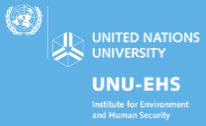Universal access to water supply and sanitation (WSS) is “a moral and practical imperative,” that is necessary for environmental integrity, economic activities, food production and health, according to ‘A Micro Financing Framework for Rural Water and Sanitation provisioning in Sub-Saharan Africa,' a publication by the UN University Institute for Water, Environment and Health (UNU-INWEH) and UNU Maastricht Economic and Social Research Institute on Innovation and Technology (UNU-MERIT).
 8 May 2014: Universal access to water supply and sanitation (WSS) is “a moral and practical imperative,” that is necessary for environmental integrity, economic activities, food production and health, according to ‘A Micro-Financing Framework for Rural Water and Sanitation Provisioning in Sub-Saharan Africa,’ a publication by the UN University Institute for Water, Environment and Health (UNU-INWEH) and UNU Maastricht Economic and Social Research Institute on Innovation and Technology (UNU-MERIT).
8 May 2014: Universal access to water supply and sanitation (WSS) is “a moral and practical imperative,” that is necessary for environmental integrity, economic activities, food production and health, according to ‘A Micro-Financing Framework for Rural Water and Sanitation Provisioning in Sub-Saharan Africa,’ a publication by the UN University Institute for Water, Environment and Health (UNU-INWEH) and UNU Maastricht Economic and Social Research Institute on Innovation and Technology (UNU-MERIT).
The paper argues that developing country governments need to advance and scale up affordable, reliable and quality WSS coverage in rural areas and proposes self-sustaining micro-financed facilities as an option for ensuring equitable, safe rural WSS provision. Inadequate access to WSS negatively affects women more than men, according to the paper, which outlines challenges in water, sanitation and hygiene (WASH). It describes the burden faced by women in collecting water, noting that women lose forty billion hours each year in daily water collection and face the risk of physical and sexual assault when collecting water or practicing open defecation. The paper also notes Sub-Saharan Africa’s lagging progress on water and sanitation Millennium Development Goals (MDGs).
The paper proposes a co-operative micro-finance framework to share the financial and social costs of WSS provision between communities and governments, stressing that the up-front capital to construct facilities is a major impediment to WSS services. The framework recommends: active, coordinated government support across relevant ministries, including finance, health, rural development and water and sanitation ministries; village demand for WSS facilitates; and clear division of responsibilities among key stakeholders to ensure accountable, transparent operations. The framework proposes the inclusion of four stakeholders: Rotating Savings and Credit Associations (RoSCAs); a community WSS committee; government; and village banks. The paper outlines responsibilities for each stakeholder and notes expected benefits for each group. It also recommends assistance from the private sector and NGOs.
The publication also addresses, inter alia, the history of micro finance institutions (MFIs), including a comparative analysis of MFIs in Africa, and rural water and sanitation MFIs. UNU-INWEH focuses on development challenges related to water access. UNU-MERIT addresses the role of innovation and governance in development. [UNU Press Release] [Publication: A Micro Financing Framework for Rural Water and Sanitation Provisioning in Sub-Saharan Africa]